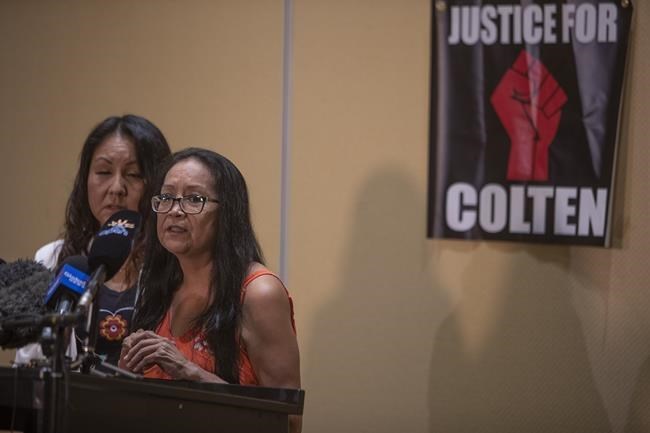WHITECAP, Sask. — The mother of a young Indigenous man shot and killed five years ago in Saskatchewan is continuing to fight for change in the justice system.Â
Colten Boushie of the Red Pheasant First Nation died Aug. 9, 2016, after a vehicle the 22-year-old was riding in went onto a farm near Biggar, Sask.
The property's owner, Gerald Stanley, testified at trial that his gun accidentally went off, shooting Boushie in the head. A jury acquitted him of second-degree murder.
"I miss my son so much," Debbie Baptiste told a news conference Monday at the Whitecap Dakota First Nation, just outside Saskatoon.
"I come here with a heavy heart today. I hope and pray for change within the justice system."
Baptiste remembers her son as a kindhearted, loving young man.Â
"He deserved a life," she said. "He had dreams, and they were cut short."
Earlier this year, the Civilian and Review Complaints Commission for the RCMP found Baptiste faced racial discrimination when RCMP officers, taking a tactical approach, went to inform her of her son's death.
It said officers questioned whether she had been drinking, searched the home and told her to "get it together'' when she collapsed in grief.
The watchdog also found an initial RCMP media release about Boushie's death mostly focused on alleged property crimes instead of a homicide investigation.
Stanley's trial heard from Boushie's friends, who testified they had been looking for help with a flat tire when they went to the farm. Stanley testified he thought they were trying to steal his all-terrain vehicle.
The commission noted that Boushie didn't appear to have left the SUV he was in, or touched any of Stanley's property.Â
"I would like everybody to remember Colten. He was a victim, not a criminal," Baptiste said.
"I wish for everybody to go home, love your kids, hold on to them as tight as you can no matter if they make you mad sometimes 'cause they don’t listen. Spend your precious time with them."
Eleanore Sunchild, a lawyer who represents Baptiste, said the family continues to push for a public inquiry into the case and how RCMP handled it.
"It’s been a hard five years for Debbie," said Sunchild. "She’s had to grieve publicly. She hasn’t really seen justice yet. The family does not accept the innocence of Gerald Stanley.Â
"The family will always continue to seek justice for Colten. [And] we still push for a full public inquiry into what happened after the killing of Colten Boushie."
In addition to discrimination, the commission said the RCMP did not properly protect the SUV that Boushie was shot in, which resulted in blood spatter evidence being lost.
"What else is there to be uncovered? What else is there that people should know?" asked Sunchild.
She said that, five years later, people still need to be reminded that Boushie was not a criminal. He did not have a criminal record.
"He was not there stealing. He was sleeping in the back of the vehicle when he woke up, jumped in the front and moments later he was shot. Those are the facts and people need to be reminded that that's what happened."
Chris Murphy, another lawyer who has represented Baptiste, said Boushie's mother has been a brave and tireless advocate for change. Two days after Stanley's not guilty verdict in 2018, Murphy said, she was on a plane to Ottawa to meet with the prime minister and cabinet ministers about changes to the justice system.
A year later, the government removed peremptory juror challenges, which had allowed either defence lawyers or Crown prosecutors to veto prospective jurors without explanation. The challenges were criticized during Stanley's trial with suggestions that they excluded Indigenous people from the jury.Â
This report by The Canadian Press was first published Aug. 9, 2021.
Julia Peterson, The Canadian Press




